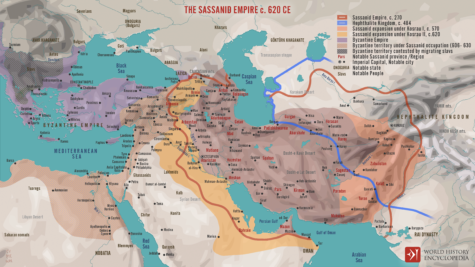For the November 2023 Systems Thinking Ontario session, historian and policy advisor Dr. Michael Bonner was invited for an interview by Zaid Khan. In organizing the sessions, we’re trying to avoid the trap of systems thinking becoming a discipline, through learning with a sweeping-in process.
The session opened on a map of The Sassanid Empire c. 620 CE, also known as Second Persian Empire, a high point for the Iranian civilizations before the early Muslim conquests of the 7th–8th centuries.
As the web conference participants introduced themselves, the number of responses with a strong background in history was low. Zaid led the interview of Michael with some probing questions:
- How did you come to the study of history and its overlap with your work?
- Can you draw on the methods that help historians to ask the right questions when historians are dealing with multiple worldviews?
- How do you relate between the two modes of analytical and synthetic thinking?
- How do historians grapple with drawing boundaries around the areas/topics of study that they look at?
- In historical synthesis, at what point does the author may form a narrative that captures their analysis and synthesis?
- How did you approach the narratives – clarity, beauty, order – that you form in your latest book In Defense of Civilization?
Further into the meeting, others were invited to join in with their questions and comments.
This recording of the session is available on Youtube, as well as on the Internet Archive .
| Video | H.264 MP4 |
| November 13 (2h04m) |
[20231113_ST-ON_Bonner_HistoricalSynthesis_1896x968.m4v] (1806×968 814kbps 846MB) [on the Internet Archive] |
A standalone audio was also created during the meeting.
| Audio | |
| November 13 (2h04m) |
[20231113_ST-ON_Bonner HistoricalSynthesis.m4a] (121 MB) [on the Internet Archive] |
Here is the core of original abstract sent in advance.
— begin excerpt —
“Analysis reveals structure. Synthesis reveals understanding.” – a marquee distillation of systems thinking, by one its luminaries, Russell Ackoff.
If synthesis – the act of putting things together – is an essential part of systems thinking, then what could systems thinkers learn from the mode of “historical synthesis”? This session will examine this question through conversation with historian Dr Michael Bonner.
Historical synthesis is the convergence of multiple stories and sources into a narrative story. This lens of not only viewing history but assembling it into a narrative whole may offer insights for practitioners of systems thinking. The connection may be especially pronounced in systemic design, where “narratives” are a central feature that emerge through designing artifacts such as synthesis maps or gigamaps.
— end excerpt —
For other videos and books by Dr. Michael Bonner, refer to https://wiki.st-on.org/2023-11-13 .
Map of “The Sassanid Empire c. 620 CE” CC-BY-NC-SA 2023 Simeon Neetchev https://www.worldhistory.org/image/16853/the-sassanid-empire-c-620-ce/



